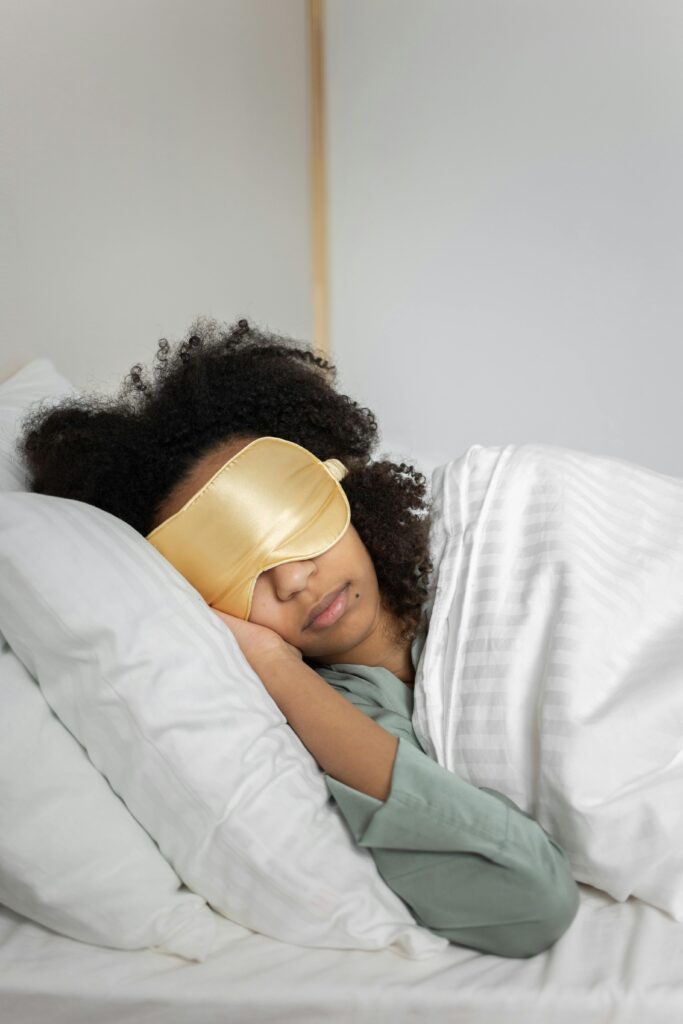Many people talk in their sleep, and some even walk in their sleep. Several factors contribute to sleep talking, so today we will discuss Talking In Your Sleep.

01. Basic Introduction to Sleep Talking (Somniloquy)
Sleep talking, somniloquy, is a sleep disorder where a person talks during sleep without being aware of it.
It can range from gibberish to full conversations and occurs during different sleep stages. Sleep talking is considered harmless but can be disturbing for a partner or anyone sharing the same room.

02. Mainly Two Stages of Sleep and Talking Sleep
Sleep occurs in cycles consisting of several stages
Non-REM (NREM) Sleep: This stage is divided into three parts, where the body and mind gradually relax. Sleep talking often happens during the lighter stages of NREM, particularly in stage 2, where the body transitions into deeper sleep but still retains some level of alertness.
- REM (Rapid Eye Movement) Sleep: REM sleep is when most dreaming occurs. Sleep talking that happens during this stage is often linked to dreams, and speech can be more emotional or animated because the brain is more active during REM.

03. Causes Of Sleep Talking
Several factors contribute to sleep talking, and these vary between individuals:
- Genetics: Sleep talking tends to run in families. If a parent or sibling talks in their sleep, the likelihood of another family member experiencing it increases.
- Stress and Anxiety: Emotional distress, including anxiety and stress, is a common trigger for sleep disturbances, including talking during sleep. During high-stress periods, a person may be more likely to vocalize their thoughts or emotions while asleep.
- Sleep Deprivation: A lack of proper rest can lead to fragmented sleep patterns, which may trigger abnormal behaviors during sleep, such as talking.
- Sleep Disorders: Conditions like sleep apnea, night terrors, and REM sleep behavior disorder are often linked to sleep talking. These disorders can cause disruptions in normal sleep architecture, making it more likely for someone to talk in their sleep.
- Medications: Certain medications that affect the central nervous system, such as antidepressants or sedatives, can also lead to sleep talking.
- Alcohol or Substance Use: Alcohol or drug consumption can affect sleep stages, potentially leading to sleep talking or other unusual sleep behaviors.

04. Different Age Groups Sleep Talking
- Children: Sleep talking is more common in children, especially in early childhood. This could be because their brain is still developing, and their sleep patterns are not as well established as in adults.
- Adults: While sleep talking tends to decrease with age, some adults may still experience it. In adults, it is often associated with stress, lifestyle factors, or underlying health issues.

05. Characteristics of Sleep Talking
- Duration and Frequency: Some people may sleep talk every night, while others might do it occasionally. It can last a few seconds or minutes, and in rare cases, it can happen several times a night.
- Content of Speech: The content of sleep talking can range from unintelligible sounds to clear words or even sentences. It can be nonsensical, emotional, or related to daily experiences. Speech during sleep is typically brief and fragmented.
- Personality of Speech: Sleep talking can be either calm or aggressive. It may mirror real-life conversations or emotions that the person is experiencing, such as anger, excitement, or frustration.

06. Sleep Talking vs. Other Sleep Disorders
Sleep talking is often confused with other sleep disorders, such as:
- Sleepwalking: Unlike sleep talking, sleepwalking involves physical movement, and the individual may perform activities like walking or dressing.
- Night Terrors: Night terrors are intense episodes of fear and panic that occur during deep sleep, often accompanied by shouting or thrashing, but are distinct from regular sleep talking, which may not involve any intense emotion.

7. Diagnosis of Sleep Talking
Sleep talking is generally diagnosed through observation by a sleep partner or family member. In cases where the sleep talking is frequent or disruptive, a doctor may recommend a sleep study (polysomnography) to monitor brain activity, breathing, and other physiological signs during sleep. The study helps rule out underlying sleep disorders.

8. Best Treatment and Management of Sleep Talking
While sleep talking usually doesn’t require medical treatment, managing the underlying triggers can reduce its occurrence:
- Stress Management: Practicing relaxation techniques, such as mindfulness or meditation, can help reduce stress, a common cause of sleep talking.
- Good Sleep Hygiene: Establishing a regular sleep schedule, avoiding caffeine before bed, and creating a calm sleeping environment can promote better sleep and reduce the likelihood of sleep talking.
- Medication Adjustment: If certain medications are causing sleep talking, a healthcare provider may recommend adjustments to the dosage or suggest alternative treatments.
- Treatment of Underlying Sleep Disorders: If sleep talking is related to sleep apnea or another condition, treating that disorder can also reduce the episodes of talking.

9. Impact of Sleep Talking on Relationships
While sleep talking itself is harmless, it can affect relationships if it becomes disruptive to a partner’s sleep. Some people may also feel embarrassed if they say strange or revealing things in their sleep. Communication and humor can help couples navigate these challenges.

Best Conclusion
Sleep talking is a common, generally benign phenomenon that affects people of all ages. While it may be triggered by stress, sleep deprivation, or other factors, it is often temporary and manageable with lifestyle changes.
If it becomes problematic or is linked to other sleep disturbances, seeking medical advice can help manage the condition more effectively.

How Can I Make Myself Sleep On My Back

How Can I Make Myself Sleep On My Back

How Can I Make My Newborn Sleep At Night 2024



5 thoughts on “Talking In Your Sleep”